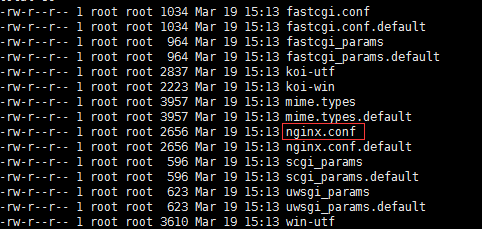1.创建nginx运行账户www并加入到www组,不允许www用户直接登录系统,查看创建。
groupadd www
useradd -g www www -s /bin/false
tail /etc/passwd
2.进入nginx的配置文件目录
cd /usr/local/nginx/conf
3.看一下目录下文件
ll

4.编辑配置文件nginx.conf,可以一项一项配置使用【/usr/local/nginx/sbin/nginx -t】查看是否配置出错。
vi nginx.conf
4.1、上边创建了用户,#user nobody 打开注释,修改为user www www
4.2、worker_processes 2; #设置值和CPU核心数一致
4.3、error_log定义错误日志文件的位置及输出级别【debug / info / notice / warn / error / crit】
error_log /usr/local/nginx/logs/error.log error;
user www www;#用来指定nginx worker进程运行用户以及用户组,默认nobody账号运行 worker_processes 1;#指定nginx要开启的子进程数量,运行过程中监控每个进程消耗内存(一般几M~几十M不等)根据实际情况进行调整,通常数量是CPU内核数量的整数倍 #定义错误日志文件的位置及输出级别【debug / info / notice / warn / error / crit】 error_log /usr/local/nginx/logs/error.log error; #error_log logs/error.log notice; #error_log logs/error.log info; #用来指定进程id的存储文件的位置 #pid logs/nginx.pid; #用于指定一个进程可以打开最多文件数量的描述 worker_rlimit_nofile 1024; #针对nginx服务器的工作模式的一些操作配置 events { worker_connections 1024;#指定最大可以同时接收的连接数量,这里一定要注意,最大连接数量是和worker processes共同决定的 multi_accept on;#配置指定nginx在收到一个新连接通知后尽可能多的接受更多的连接 use epoll;#配置指定了线程轮询的方法,如果是linux2.6+,使用epoll,如果是BSD如Mac请使用Kqueue } http { include mime.types;#指定在当前文件中包含另一个文件的指令 default_type application/octet-stream;#指定默认处理的文件类型可以是二进制 log_format main '$remote_addr - $remote_user [$time_local] "$request" ' '$status $body_bytes_sent "$http_referer" ' '"$http_user_agent" "$http_x_forwarded_for"'; access_log /usr/local/nginx/logs/access.log main;##用于指定该虚拟主机服务器中的访问记录日志存放路径,main是上边log_format定义的格式 sendfile on;#配置on让sendfile发挥作用,将文件的回写过程交给数据缓冲去去完成,而不是放在应用中完成,这样的话在性能提升有有好处 tcp_nopush on;#让nginx在一个数据包中发送所有的头文件,而不是一个一个单独发 tcp_nodelay on;#让nginx不要缓存数据,而是一段一段发送,如果数据的传输有实时性的要求的话可以配置它,发送完一小段数据就立刻能得到返回值,但是不要滥用哦 #keepalive_timeout 0; keepalive_timeout 65;#给客户端分配连接超时时间,服务器会在这个时间过后关闭连接。一般设置时间较短,可以让nginx工作持续性更好 client_header_timeout 10;#设置请求头的超时时间 client_body_timeout 10;#设置请求体的超时时间 send_timeout 10;#指定客户端响应超时时间,如果客户端两次操作间隔超过这个时间,服务器就会关闭这个链接 limit_conn_zone $binary_remote_addr zone=addr:5m;#设置用于保存各种key的共享内存的参数, limit_conn addr 100; #给定的key设置最大连接数 gzip on;#是告诉nginx采用gzip压缩的形式发送数据。这将会减少我们发送的数据量 gzip_disable "msie6";#为指定的客户端禁用gzip功能。我们设置成IE6或者更低版本以使我们的方案能够广泛兼容 gzip_types text/plain text/css application/json application/javascript text/xml application/xml application/xml+rss text/javascript; #主要负责负载均衡的配置,通过默认的轮询调度方式来分发请求到后端服务器 #-- max_fails:表示失败最大次数,超过失败最大次数暂停服务 #-- fail_timeout:表示如果请求受理失败,暂停指定的时间之后重新发起请求 upstream nginxServer { ip_hash;#指定请求调度算法,默认是weight权重轮询调度,可以指定 server localhost:8000 max_fails=3 fail_timeout=3s;#可以用localhost,调用同一台服务器上server,也可以用ip或域名,代理其他服务器 server 60.110.110.60:8001 down;#表示该主机暂停服务 server 60.110.110.60:8002 max_fails=3 fail_timeout=3s; server 60.110.110.60:8003 max_fails=3 fail_timeout=3s; server 60.110.110.60:8004 max_fails=3 fail_timeout=3s; server 60.110.110.60:8005 max_fails=3 fail_timeout=3s; } server { listen 80; server_name www.xxx.cn;#指定ip地址或者域名,多个配置之间用空格分隔 charset utf-8; #access_log logs/host.access.log main; #location / { # root html; # index index.html index.htm; # proxy_pass http://nginxServer/; # proxy_set_header Host $host; # proxy_set_header X-Real-IP $remote_addr; # proxy_set_header X-Forwarded-For $proxy_add_x_forwarded_for; #} #error_page 404 /404.html;#用于指定该虚拟主机服务器中访问错误日志的存放路径 rewrite ^(.*)$ https://$host$1 permanent;#强制http访问https端口。如果不用https协议注掉 # redirect server error pages to the static page /50x.html # error_page 500 502 503 504 /50x.html; location = /50x.html { root html; } # proxy the PHP scripts to Apache listening on 127.0.0.1:80 # #location ~ .php$ { # proxy_pass http://127.0.0.1; #} # pass the PHP scripts to FastCGI server listening on 127.0.0.1:9000 # #location ~ .php$ { # root html; # fastcgi_pass 127.0.0.1:9000; # fastcgi_index index.php; # fastcgi_param SCRIPT_FILENAME /scripts$fastcgi_script_name; # include fastcgi_params; #} # deny access to .htaccess files, if Apache's document root # concurs with nginx's one # #location ~ /.ht { # deny all; #} } # another virtual host using mix of IP-, name-, and port-based configuration # #server { # listen 8000; # listen somename:8080; # server_name somename alias another.alias; # location / { # root html; # index index.html index.htm; # } #} # HTTPS server server { listen 443 ssl; server_name www.xxx.cn; ssl_certificate cert/www.xxx.cn.pem; ssl_certificate_key cert/www.xxx.cn.key; ssl_session_cache shared:SSL:1m; ssl_session_timeout 5m; ssl_ciphers ECDHE-RSA-AES128-GCM-SHA256:ECDHE:ECDH:AES:HIGH:!NULL:!aNULL:!MD5:!ADH:!RC4; ssl_protocols TLSv1 TLSv1.1 TLSv1.2; ssl_prefer_server_ciphers on; location / { root html; index index.html index.htm; proxy_pass http://nginxServer/; proxy_set_header Host $host; proxy_set_header X-Real-IP $remote_addr; proxy_set_header X-Forwarded-For $proxy_add_x_forwarded_for; } } }
5.启动
/usr/local/nginx/sbin/nginx
6.重新加载
/usr/local/nginx/sbin/nginx -s reload
7.重启
/usr/local/nginx/sbin/nginx -s reopen
8.停止
/usr/local/nginx/sbin/nginx -s stop
9.设置开机启动
vi /etc/init.d/nginx
#! /bin/bash # chkconfig: - 85 15 PATH=/usr/local/nginx DESC="nginx daemon" NAME=nginx DAEMON=$PATH/sbin/$NAME CONFIGFILE=$PATH/conf/$NAME.conf PIDFILE=$PATH/logs/$NAME.pid SCRIPTNAME=/etc/init.d/$NAME set -e [ -x "$DAEMON" ] || exit 0 do_start() { $DAEMON -c $CONFIGFILE || echo -n "nginx already running" } do_stop() { $DAEMON -s stop || echo -n "nginx not running" } do_reload() { $DAEMON -s reload || echo -n "nginx can't reload" } case "$1" in start) echo -n "Starting $DESC: $NAME" do_start echo "." ;; stop) echo -n "Stopping $DESC: $NAME" do_stop echo "." ;; reload|graceful) echo -n "Reloading $DESC configuration..." do_reload echo "." ;; restart) echo -n "Restarting $DESC: $NAME" do_stop do_start echo "." ;; *) echo "Usage: $SCRIPTNAME {start|stop|reload|restart}" >&2 exit 3 ;; esac exit 0
将上方脚本代码cp到vi的nginx文件中,修改其中的PATH路径改为自己的安装路径。
然后授权
chmod a+x /etc/init.d/nginx
/etc/init.d/nginx start /etc/init.d/nginx stop chkconfig --add /etc/init.d/nginx service nginx start service nginx stop chkconfig nginx on chkconfig nginx off